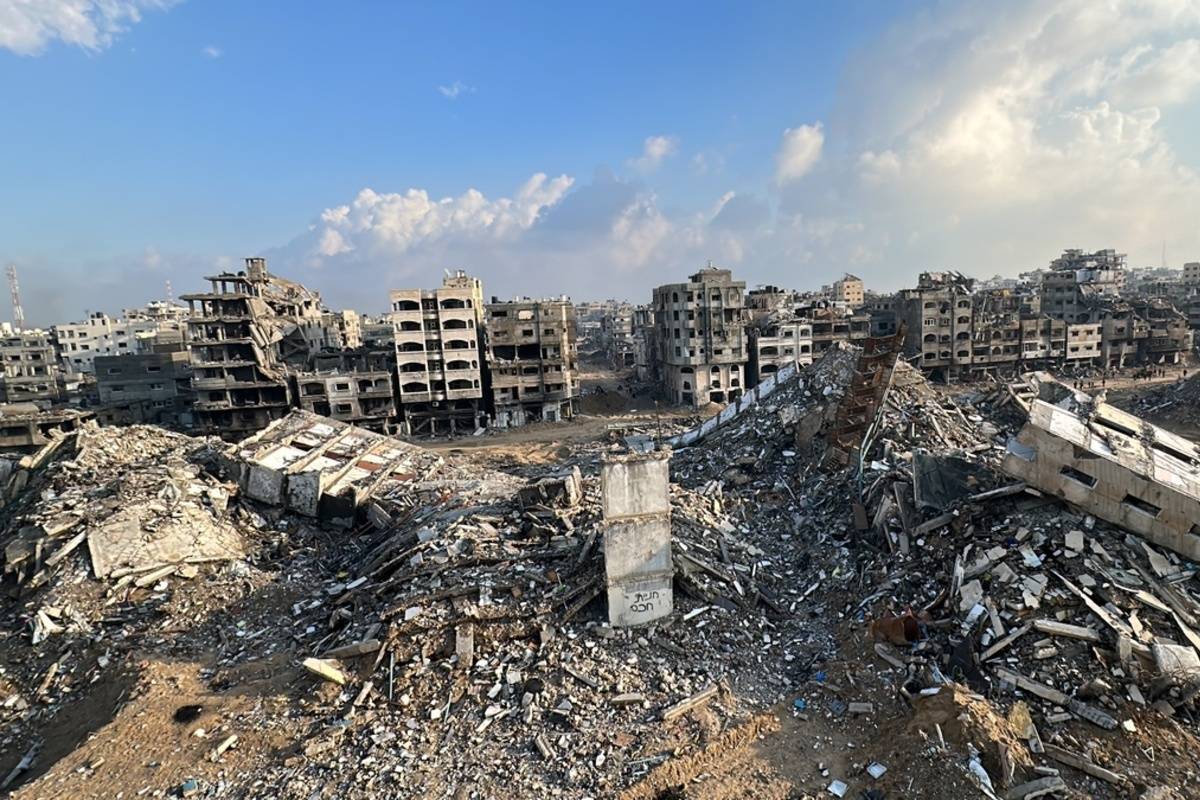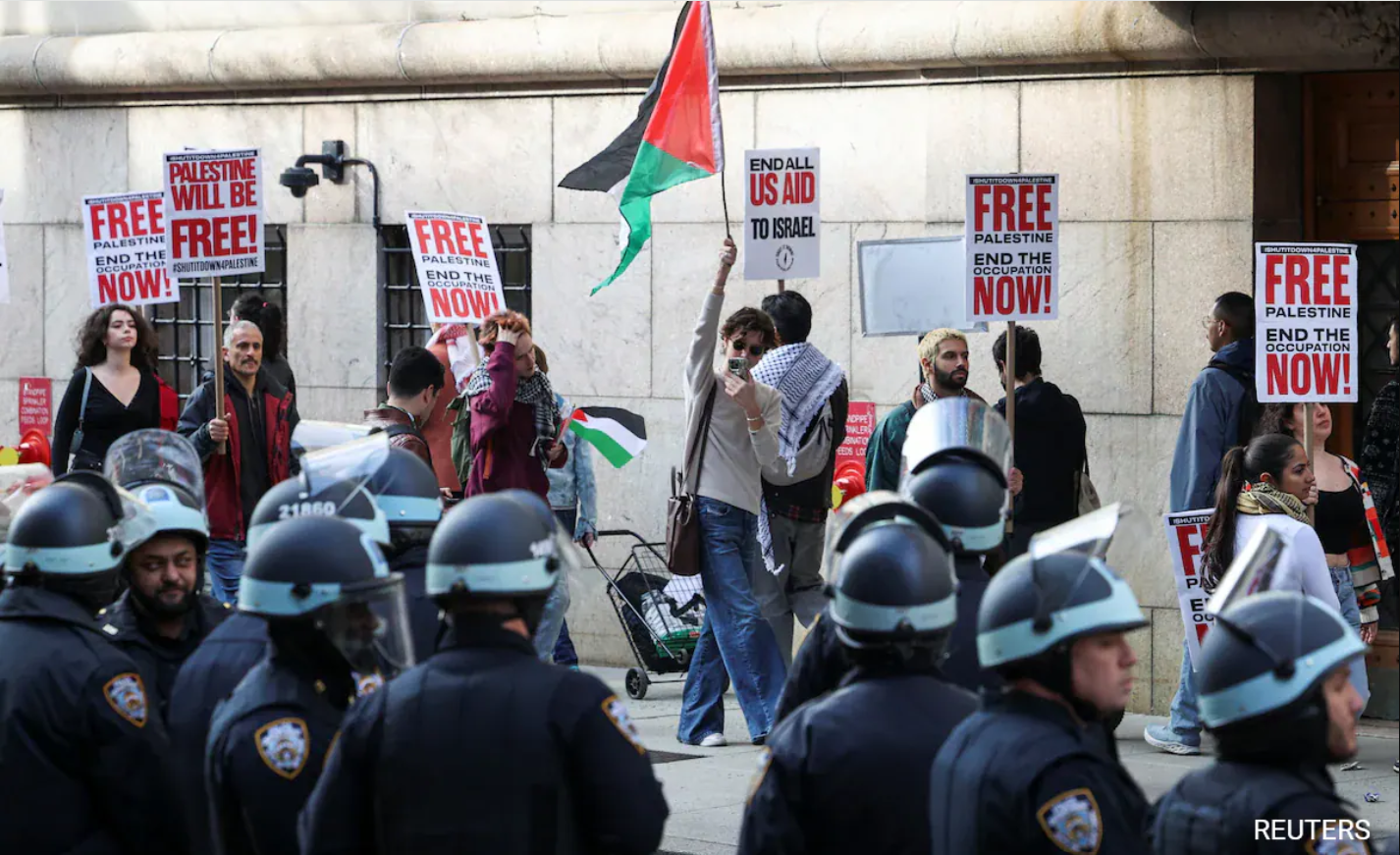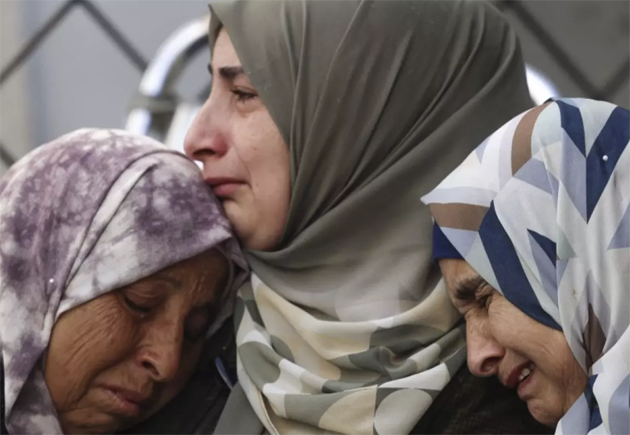Despite the many obstacles imposed by Israel and even with all the damage inflicted against schools and educational institutes, the Ministry of Education was able to play a unique role in maintaining the Palestinian education process and getting through another school year. The hardships endured by Palestinian schools include the murder of 232 school children and injuring of over 2500 students. 197 schools were damaged as a result of shelling and shooting by the occupation forces; dozens of schools were turned into military camps while 7 were completely shut down by the Israeli forces.
Q. Let me start by asking you about the secondary school matriculation examination (Tawjihi) and how the Ministry was able to carry out the exams despite the curfews, checkpoints and reoccupation of PNA areas?
A. From the beginning we had aimed to maintain the education process in Palestine despite all hardships and obstacles. We have been operating under an emergency plan since the beginning of the Intifada, and had planned ahead with regards the exams which we were able to conduct, offering every potential high school graduate the opportunity to take the exam, even the students at prison. We had to restructure geographically the exam halls placing them in areas that might be easier to access as well as increasing their numbers in order to preserve a good chance for students to get there. Every hall had a proctor and assistant proctor as well as a fax machine for backup, in case the need to fax the questions would arise, so, they (the students) can start on time. There were towns that held the same exam up to 3 times, such as Nablus and Bethlehem, since the Israeli troops refused to allow students to leave their homes. The exams were supposed to start on June 17th and end on July 4th but instead it took 42 days to complete the exams, an unprecedented experience.
Q. How were you able to complete exams even though the Palestinian towns were under curfew?
A. I have to point out the important role played by the Red Cross, for they took care of transferring and disseminating exam papers and then collecting them and transferring them to faculty members who were in charge of correcting the exams and worked around the clock for 20 days in order to meet the deadline. The Red Cross helped by transferring the corrected exams allowing the results to be disseminated in all areas at the same day as planned. They, also, shuffled exam halls and correction halls transporting them in a way to avoid the curfews. In some cases like Jenin and Tulkarem the exams were taken, corrected and then posted the very next day. It was a difficult task but it was achieved with great debt to the tireless efforts and determination of the Palestinian civil society that refused to give in to the reality of occupation.
Q. In the past academic year, there were many school days missed as a result of the occupation, what effect does this have on the Palestinian students and education process?
A. First, I have to point out that this effect differs from one area to another. Some schools, for example at a village, had all its students attend since they all lived there. They were able to attend after we had secured those schools teachers of course. Generally, we had to adjust and readjust, sometimes moving an entire school and shuffling staff and teachers placing them in areas they can get to in order to carry on with our schooling. This is all part of the emergency plan we have been working under for the past two years.
Q. How has the destruction, shelling, imprisonment and murder affected the students and teachers mental well-being?
A. There is no doubt that the Israeli aggressions have left students and teachers disturbed, especially those at schools where students and teachers lost their lives or got injured by the occupation forces. School counselors have been assigned to every school, where professionals dealt with general and specific cases under the theme "continuing to learn is better than doing nothing." It is important to mention that the most affected aspect of education has been the extra curricular activities, which would have offered an outlet for the students, but having to make up the material and days lost became the priority taking precedence over such activities.
Q. Is there a national initiative to offer counseling to students suffering from negative consequences arising from a traumatic experience such as the loss of family members, friends or classmates?
A. This initiative will need many civil society organizations and different ministries in order to cover the broad and varying needs of students. Since 1994, the MOE (Ministry of Education) has hired 450 school counselors, who are working throughout the West Bank and Gaza. In the past two years, they have been working under the emergency program, helping students in need of special attention, such as those who have lost a classmate or were badly beaten or injured. These efforts include home and hospital visits, inviting the students to take their exams were ever they might be, and therefore, offering them an alternative and making things easier for them. In this specific year, we have increased the number of summer camps in order to make up for the gap felt by students in the absence of extra curriculum activities.
Q. What about the teachers and these programs?
A. The teachers have been carrying a great responsibility these past two years, for they had to play the role of father, mother, brother and advisor. Teacher training courses have been conducted in the areas, which allow teachers to offer maximum support. Subjects such as First Aid, mental support and optimism for the students have been the focus of these training courses. I would like to take this opportunity to thank the families of educators (employees of the MOE) who risked their lives on a daily bases, doubling their efforts in order to serve the community in a very strenuous and dangerous time.
Q. Having experienced two very tough academic years, what are you planning for the forthcoming year, at a time that is even more difficult than what you have faced in the past two years?
A. Honestly, this coming school year 2002/2003 is particularly difficult in light of the collective punishment being practiced against us, separating our towns, cities and villages. The education process is comprised of a community and not just the Ministry in order to ensure the following: first, the movement of 45,000 teachers throughout closed roads risking their lives; second, the movement of another 1 million students traveling in restricted areas endangering their lives; third, the movement of hundreds of trucks transferring books and equipment between the West Bank and Gaza as well as from one school to another; finally, the health and academic needs of the students, which are tied with schools and students in order to maintain a healthy environment providing medical assistance were needed. All of us work together in order to teach our children, while keeping Europeans, Americans and international institutes informed, as we continue to ask for immediate intervention to insure our children's lost rights.
Q. What Institutions offer help to our education system, and what type of help is offered?
A. There are different forms of international help. Pressuring Israel, for example, has been the most important help offered. We were able to ensure some students' rights through pressure applied by UNESCO and UNICIF, through their reports on the hardship and aggression practiced against our Palestinian children. Europe, for example, concentrates on monetary funding of Palestinian education, especially France and Norway, who have built schools and funded school construction as well as educational equipment projects. There are also Arab countries that offer their support. Saudi Arabia for example has a college fund to support Palestinian higher education students. There are five Arabic funds that help needy students pay for universities or books. It is important to note that local funding subsidizes 40% of all funds, showing the high regard held for education by our local communities.
Q. Israel's accusations of the Palestinian education system inciting violence have been discredited, can you comment on the matter?
A. I would like to first comment on the new curriculum, of which we are very proud. We started preparing the new curriculum in 92' with the participation of 80 academics, then the creation of a team headed by Dr. Ibrahim Abu Lughod. After four years of preparation, we launched the new five-year plan. This plan not only unites the curriculums used in Gaza and the West Bank, but it offers us a historical opportunity to leap forward and close the gap by improving the education process. This five-year plan is due to finish in 2005, at which time the entire education sector will be using the new unified curriculum. What's new in this Palestinian curriculum? Languages, with English being taught in first grade and French at the start of high school. Other subjects added include technology, health, ethics, environmental studies, and civic education, while at the same time continuing to offer a concentration in technical and vocational studies. We conducted discussions with the Ministry of Higher Education in order to meet their needs and offer all our students, whether concentrating on academic, technical or vocational studies, an opportunity to pursue higher education. We were surprised at the attacks against the new Palestinian curriculum by an extremist group of Israeli right-wingers, who sent complains all over the world in an effort to discredit Palestinian educational achievements. There were national political norms that this group of Israelis had a problem with and they sought to defeat them by branding our curriculum a prejudiced one, when we emphasize teaching our children tolerance. We sent clarifications worldwide, and both the Israeli and Palestinian curriculums were examined. A month ago, Europe issued a statement calling the Israeli accusations politically motivated and having no weight as far as education and the curriculum is concerned.
Q. Language, curriculum and education make up identity, so was Israel aiming to rob Palestinian students of their identity?
A. When we talk about our culture, about Al-Aqsa, Holy Sepulcher or Jerusalem, the Israelis seem to get worked up, since it represents a Palestinian identity. They (Israel) asked us to draw borders for 'Palestine' (West Bank and Gaza) in our new curriculum, I answered them by pointing out that members of parliament draw the borders and after signing official agreements the borders will be clear, from here I had to ask why doesn't Israel draw its borders (without including occupied land as part of Israel)?







